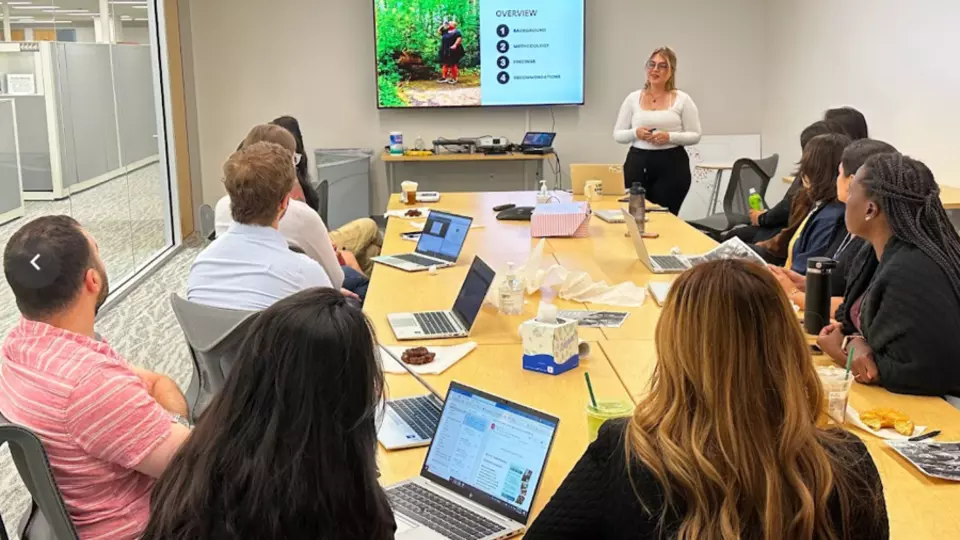Fellowship Program Offers Higher Ed Students High-Level, Real World Work Experience with County
Assignments include projects related to justice involved youth, gender-based violence prevention, the Office of LGBTQ Affairs, the Valley Health System, Social Services, the Sheriff’s Office, and Tech Services

SANTA CLARA COUNTY, Calif. – The application period has opened for the County’s Fellowship Program, which embeds a limited number of higher-education students in various County agencies, departments and board offices to do high-level work that lends itself to in-demand jobs.
It’s a boon for both the students and the County – by matching interests, skills and career goals with local government functions, the goal is to equip the student with real-world experience while fostering an interest in joining the County team.
“We’ve seen these students do incredible and meaningful work across a multitude of County departments,” said County Executive James R. Williams. “Some of the students either stick around or come back after completing their education, having had a rewarding experience with the County, and we hope all of them bring their County experience to the work they do and to our broader community.”
Student projects run the gamut of County services and departments, including assignments related to justice involved youth, gender-based violence prevention, the Office of LGBTQ Affairs, the Valley Health System, Social Services, the Sheriff’s Office, and Tech Services.
In the past, students have created branding for the Voter’s Choice Act with the Registrar of Voters Office; assessed equity and inclusion across County departments through qualitative analysis; partnered with nonprofits to help members of the homeless community better access services; created an action plan to retain minority physicians and nurses; completed studies related to transgender employment recruitment; helped Vector Control collect and analyze data on mosquitos; and much more.
Two of this year’s fellows had their placements extended so they could complete their projects, and three of them accepted offers to continue working for the County as Extra Help Employees.
"This placement complemented my academic background in psychology and child and adolescent development, and interests in marginalized and minoritized groups,” said Cheyenne Grant, a San Jose State University student who worked to create public messaging on the opioid crisis aimed at justice-involved youth. “This was an immensely enriching experience that I have shared with professors at my alma maters in hopes of getting more students to take advantage of this great opportunity to work with our County leaders.”
The program was created in 2016 and had its first Fellows the following year, with an average of eight students in the program each summer. The program was reduced in size during the pandemic due to in-person restrictions, and this year’s program saw a one-time bump in funding that resulted in a bumper crop of fellows, with 18 participating. The next cohort will include approximately 10 students.
Students will typically work full-time for eight to 10 weeks in Summer 2024 and are paid a stipend of up to $10,000. Recruitment began Nov. 13 and runs through Dec. 13.
Last summer’s cohort came from seven educational institutions: Menlo College, San Jose State University, Santa Clara University, Stanford University, UC Irvine, UCLA and De Anza College. Participants must be currently enrolled in an institute of technology, community college, four-year university, graduate program, trade school or similar facility that offers a degree or certification after high school.
Placements vary by year and the nature of the program is evolving. For example, starting with the latest cohort, there was an emphasis on exposing each fellow to a variety of County departments and functions beyond their specific placement. There was also a focus on increasing networking among the Fellows to help enrich the experience and create a community of students discovering together what the County has to offer.
“Many expressed how surprised they were to learn about the multitude of ways the County supports residents and fills in service gaps, and they really enjoyed getting to know each other to develop friendships,” said Fellowship Program Manager Jennifer Roth. “When it comes to exploring the County as a possible future employer, networking is just as important as learning about the specific work a particular department provides.”
Faith Fernandez, a Stanford student who – among other accomplishments – helped establish a doula pilot program with the Office of Health Equity and Improvement after Medi-Cal benefits were expanded to include such services, said the program benefitted her skillset in a number of ways.
"The fellowship honed my communication, collaboration, and project planning skills, preparing me for a future career emphasizing diverse team cooperation,” said Fernandez. “The program's dedication to community needs inspired a desire to work for the County, given the passionate and synergetic environment in the Office of Health Equity and Improvement.”
Learn more about the program, student requirements and how to apply at https://fellows.sccgov.org/home